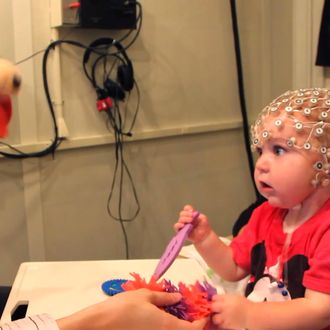
April Benasich, a neuroscientist at Rutgers University-Newark, and her colleagues just published an interesting new study in The Journal of Neuroscience about a technique they’re developing to help infants acquire language skills more efficiently. The short version is that babies who played a game involving hearing and reacting to certain sounds in Rutgers’ Infancy Studies Lab showed signs of superior acoustic processing — key to language acquisition and development — than those in a control group or those who heard the sounds but didn’t play an associated game.
Here’s a video, courtesy of the university, explaining the findings:
So what might this mean for parents? “For those [babies] who have genetic or other factors that put them at risk for developing language disorders, this baby-friendly interactive ‘game’ has the potential to be particularly beneficial,” said Benasich in an email.
But the long-term possibilities are even broader, she explained.
Though our priority is always to focus on the science underlying the questions we study, the very real potential for the development of a device that could be used by parents to deliver the training to babies at home is incredibly exciting. The pieces of technology needed to deliver these carefully constructed sound patterns and visual ‘rewards’ that we use in the lab – and to track the baby’s responses so that the training is appropriately delivered – are all actually available today on a pretty inexpensive basis. This prospect, that our findings may have real world application to the benefit of potentially any child, obviously gives additional meaning to our work.
We’re not there yet, though. “Before anything else, it’s important to get the science right,” Benasich said. “We’ve been working on this for some years now, and we’re hopeful that it can pay off in practical ways.”




